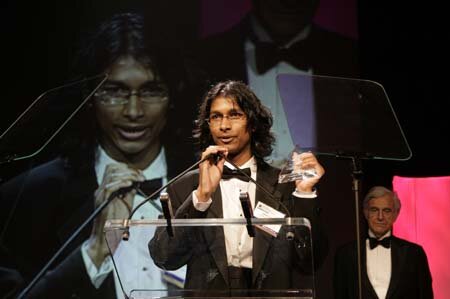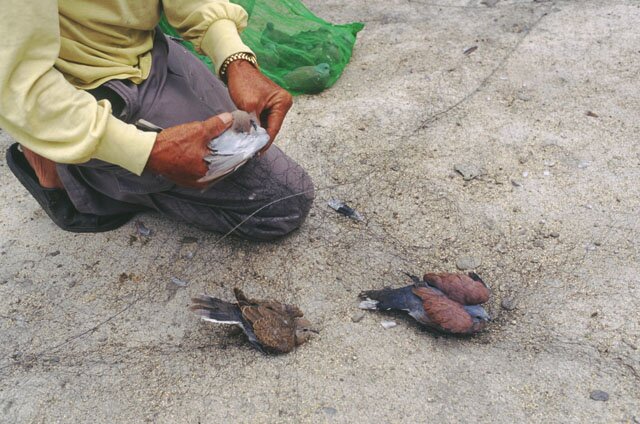BROWSE COUNTRIES/ TERRITORIES
18 years old — and a CEO
With a Wall Street address and wisdom beyond his years, Mohammed Omar Faruk tells asia! how business can take care of the world.
Youthful entrepreneurship is hardly new; in the US, selling lemonade or delivering newspapers for a little extra money is practically a rite of passage. But in these high-tech times, an age where the best source for pimping your MySpace page might very well be your 13-year-old nephew, young people are not only forging new roads in business but giving old ones a makeover.
In Brooklyn, Mohammed Omar Faruk is one such up-and-coming businessman. Omar and I recently connected one Friday, coordinating his early evening in New York with my late afternoon in California, to chat about how he came to lead the somewhat double life of an 18-year-old high school senior and CEO of BlueStream, a company that provides low-cost web services and computer training to non-profit organisations.
With our sole contact via e-mail and phone, I wouldn’t know what he looked like were it not for his impressive Google presence; one of the search hits yielded — what else? — his MySpace page, readily disclosing he’s five foot ten, has chin-length black hair, he’s single, and he’s a Cancer.
Still, he was a CEO, so I kept my professional hat firmly affixed through all our correspondence, signing e-mails with “thank you” and “regards” (rather than the decidedly less formal “peace out”). Then, while we were both scoping out the best spots on our respective coasts for proper cell phone reception and interview-level quiet, he got a call on his other line.
“Oh, excuse me,” he says.
In the background: Miguel...hey man, are you still coming over?
I suddenly felt at ease. Omar Faruk, wunderkind chief executive, also seemed like a nice, normal, 18-year-old guy, about to hang out with a friend on a Friday night.
One of his 308 friends on MySpace.
Yeah, he definitely knows a thing or two about networking.
Not surprisingly, Omar’s economic savvy and penchant for taking chances appeared early on. “I helped people bag groceries for tips. I was like, 11,” says Omar, who had intuitively followed a basic business principle: find a need and fill it. But the need was also his own. His family had just moved to the US from Bangladesh, and with nine children including himself, simple things became money issues: “School trips cost money. When [the trip] was free, I got to go, but food and everything was always more.” With his earnings, Omar was able to fund those grade school field trips, and he didn’t stop there. In junior high he sold cakes, and later on, began his first entrepreneurial endeavor — one the staff at asia! could appreciate — his own magazine.
“Well, it was more of a newsletter,” he admits, adding it didn’t last as long as he’d hoped: “You know how they say 50% of companies fail the first year?” He is extremely candid, almost self-effacing, telling me this venture didn’t work out as planned. I for one didn’t know 50% of companies didn’t make it the first year.
He felt slightly impeded when he launched an online retail business with his brother-in-law at the age of 16. “We originally wanted to import stuff. Sell wholesale products online. There were issues, lots of trial and error,” says Omar. Because of his age, there were problems with him getting a bank account, as well as legal concerns with being President and CEO, preprinted business cards or not. Fortunately, his brother-in-law and partner lent support there, and his youth was less of a liability in the ecommerce market, where government regulations differed slightly.
What did his family think about him starting a company at such young age? “I was the independent and rebellious one. They didn’t ask questions,” Omar says of his loved ones, including his Bengali-only-speaking mother, who might have trouble with the English as much as the technical jargon — arguably a language of its own — needed to explain the details of what he does. Nonetheless, his background informs his work: eventually the company moved into web design (one of his personal interests), and Omar began to devote part of his efforts to helping others succeed in business, and getting people and businesses to become more involved in the community.
One example is BlueStream’s collaborations: “I currently have a mentor who’s helping us with the Action Network. They get movie tickets, clothing, and other commodities and offer those products as incentives.” Omar also clarifies he doesn’t do the website design and consulting services himself, but facilitates the outsourcing, uniting freelancers seeking jobs with clients seeking the freelancers. “BlueStream’s not set up to do millions of dollars, or even a few,” Omar says with a laugh, but just as he did in his first job, he’s recognized a need and filled it. Despite his not being a millionaire yet, the company’s pulled in a $20,000 revenue since 2004. Along with other entrepreneurship related activity, that’s enough to support both himself and the continued operation of BlueStream.
What’s more, Omar is repaving the way to corporate enterprise with a concern for the public good. Currently BlueStream Corp. builds sites for a variety of markets, including retail, advertising, and music. Underneath BlueStream, Omar also runs desiflames.com, which offers free music downloads to the South Asian community, and MyRedTag.com, described by Omar as an “Internet marketplace for young entrepreneurs and small businesses.” BlueStream not only provides useful services, but cultivates economic communities often neglected or disenfranchised: non-profit organizations, ethnic minorities, business owners just starting out. Omar may by definition be a newbie CEO, but what he lacks in experience, he makes up for in social awareness and creativity.
Others agree. Omar received one of the 2004 honours for Growing Up CEO, sponsored by the Initiative for a Competitive Inner City, which is awarded to 25 emerging leaders 21 and under. He also won a 2005 Atlantic Fellowship, in which Merrill Lynch grants “exceptional high school students…the opportunity to explore the business world firsthand and to discover the variety of careers in the financial services industry.” Both achievements have given him access to invaluable instruction and mentorship in the field. Most recently, Ernst & Young presented Omar with the prestigious Youth Entrepreneur Award this past summer.

The Ernst & Young Entrepreneur of the Year Award
At the time of this writing, Omar had just transferred from New York City’s High School of Economics and Finance to Independence High School, which allows him the flexibility to balance academics, business, extracurricular activities (he’s president of student government), and a social life (again, this chief executive is currently single). He’s also very active in volunteerism and politics, organizes local MeetUps, advocates AIDS awareness, and is an instructor for the National Foundation for Teaching Entrepreneurship, or NFTE.
As an alumnus, Omar says he will always be part of NFTE (pronounced “nifty”), and try to share as much of the insight gained from his experiences. “I try to impress the real cost of labour and reselling. In a mock venture…the key profit isn’t just the cost of say, $12 earrings sold for $13 as $1 profit. There’s the cost of travel [and other things].” He also fervently supports self-promotion: “All your programmes, activities, and experiences contribute [to your qualifications]. Put them on your résumé! Don’t be afraid to brag! It’s the only place you’re allowed to.”
Armed with more knowledge than most beginning entrepreneurs, Omar says his journey with BlueStream has totally impacted how he views business, and himself: “I know that I’m a huge risk taker!” He elongates the word huge so it’s more like “HUUUGE!”— the very sound reflecting his confidence. “I have the courage to take on other projects,” he adds. “Any idea I have [and want to pursue], I know I have the guts to take the risk.”
Omar’s regular day begins at 6 am; he’s got books to read, papers to write, a company to run. With college and plans for his own non-profit on the horizon, Omar has already fulfilled his own version of the American dream, and done it with a sensitivity for what’s outside the office high-rise, beyond the boardroom. That’s a breath of fresh air in today’s corporate atmosphere.
While Omar does want to expand the company and make money, he hopes “the Action Network and other non-profits will be able to give back to the community as the community is giving to me, in a sense…I do not think profit for me is a big concern as long as it pays the bills…it’s not my biggest concern. I do not have any investors so I do not have to please anyone else but my clients and myself.” He’s one of the new visionaries who see the vast macro- and micro- of economics, business as means for betterment both global and personal, especially for someone coming to it as he first did: “I know for immigrants it can be hard, but the best way to defeat hardship is with entrepreneurship. We know what opportunities are there.”
He seems to be doing just what business author Kenneth H. Blanchard advises: “When people go to work, they shouldn't have to leave their hearts at home.” If they approach it like Omar does, they won’t have to.
Related Story:
Login or Register

- Asian Dynasties and History
- Conservation of the Environment
- Definition: Culture
- Economy and Economics
- Food and Recipe
- Geopolitics and Strategic Relations
- Health and Body
- Of Government and Politics
- Religion and Practices
- Social Injustices and Poverty Report
- Society, Class and Division
- Unrest, Conflicts and Wars































 Another Point
Another Point From Jerusalem to the West Bank
From Jerusalem to the West Bank
Comments
"best way to defeat hardship is through entrepreneurship"
As an American living in Japan I find myself able to relate with this. For "foreigners" in any country the only way to rise above deteriorating wages, lack of health benefits and security is to become the captain of your own ship. The most important values are passion, a tenacious will, and acute awareness of the local and national economic climate. But also being compassionate and wanting to give back to the community are essential. That's a sure-fire way to motivate those working for you as well as the locals that do business with you. Share the wealth!
Post new comment